
January’s Topic of the Month – Coping with Dry Eyes and Mouth
 February 01st, 2018
February 01st, 2018 Nakita Cambow
Nakita Cambow Blog
Blog 0 Comments
0 Comments
Many people with lupus will experience symptoms such as dry eyes and/or a dry mouth. These symptoms are most commonly caused by Sjögren’s (pronounced show-gren’s) syndrome, an autoimmune disease that causes inflammation and damage to the glands that produce moisture. About one-third of people with SLE have secondary Sjögren’s syndrome.
You can learn more about Sjögren’s syndrome, including the other symptoms and how it is diagnosed at NHS Choices HERE, and at the British Sjögren’s Syndrome Association HERE. This article will focus on two of its most common symptoms with tips to manage them; dry eyes and dry mouth.
Dry Eyes
What are the causes?
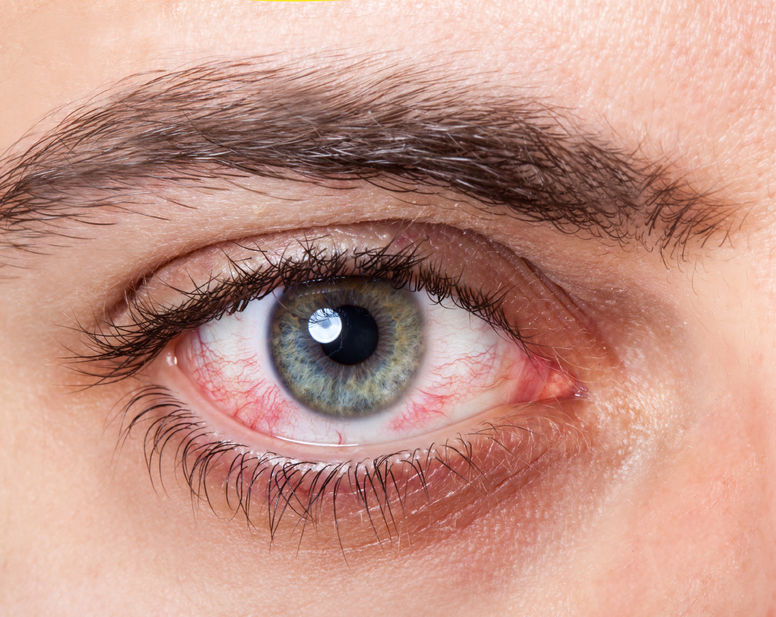 When the glands that secrete tears (the lacrimal glands) become inflamed and damaged their tear production is decreased. Tears are very important for coating the clear part of the eye (the cornea) and they allow the eyelids to blink comfortably. If your eyes are healthy, tears should be in your eyes all day, every day, not just when you are crying. Tears keep the cornea hydrated and protect it.
When the glands that secrete tears (the lacrimal glands) become inflamed and damaged their tear production is decreased. Tears are very important for coating the clear part of the eye (the cornea) and they allow the eyelids to blink comfortably. If your eyes are healthy, tears should be in your eyes all day, every day, not just when you are crying. Tears keep the cornea hydrated and protect it.
In addition to decreasing tear production, the Meibomian glands of the eyes can become inflamed and malfunction. The Meibomian glands are located on the rims of the eyelids and secrete an oily film called meibum that coats the tear film on the eyes to decrease evaporation. Meibum also lubricates, allowing the eyelids to move even more smoothly over the eyeballs. With less production of meibum, tears evaporate more quickly, which is especially problematic where there are fewer tears being produced already.
Eye dryness is an important problem to identify, diagnose and treat. If left untreated it can potentially cause permanent damage to the cornea, and this can cause permanent problems with vision. Usually the symptoms of dry eyes come on very slowly – over several years. If you have any of these symptoms you should inform your doctor sooner rather than later.
Common symptoms of dry eyes include;
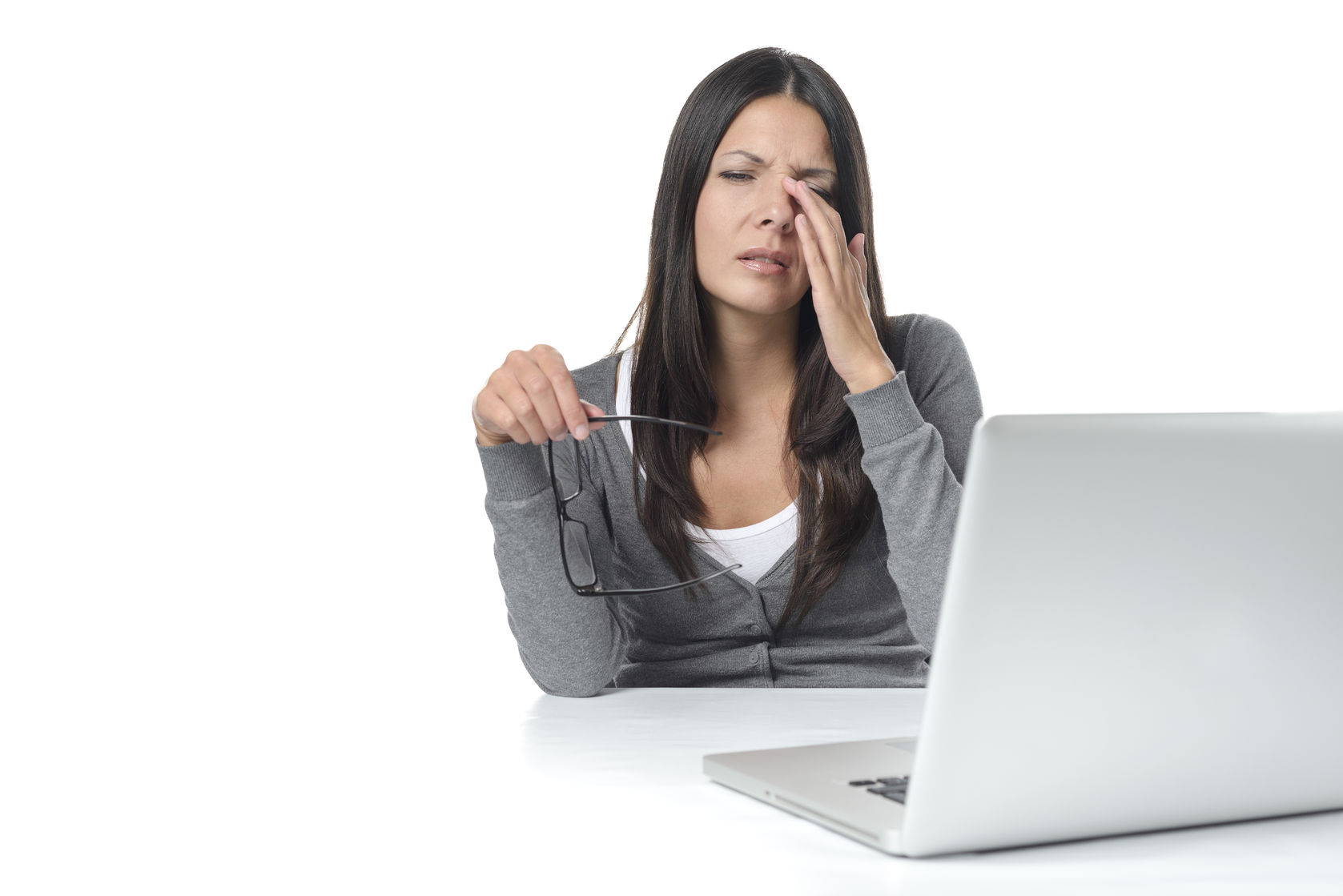 A feeling of grittiness.
A feeling of grittiness.- A sensation of a foreign object in the eye.
- Redness of the white (sclera) of the eyes.
- Blurred vision.
- Photophobia (intolerance of light).
- Ropey, thick secretions in the eyes, especially when first awakening from sleep.
- Difficulty opening the eyes in the morning due to dryness.
- Red, tender eyelids (blepharitis).
–
How is it diagnosed?
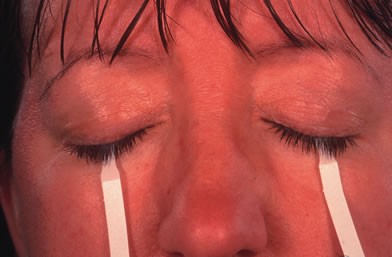 A procedure commonly used to diagnose dry eyes is called the Schirmer test. A small strip of sterile paper is placed under the eyelid, with part of it hanging down outside the eye. The person closes their eyes for five minutes. The test may cause some slight irritation and discomfort. After five minutes, the paper is removed from the eyes and the amount of paper that is wetted with tears is measured in millimetres. If less than 5mm of the paper is moistened with tears, it is considered abnormal, and the person is considered likely to have decreased tear production.
A procedure commonly used to diagnose dry eyes is called the Schirmer test. A small strip of sterile paper is placed under the eyelid, with part of it hanging down outside the eye. The person closes their eyes for five minutes. The test may cause some slight irritation and discomfort. After five minutes, the paper is removed from the eyes and the amount of paper that is wetted with tears is measured in millimetres. If less than 5mm of the paper is moistened with tears, it is considered abnormal, and the person is considered likely to have decreased tear production.
What can I do to help manage dry eyes?
There are a number of things that you can do to help relieve your dry eyes;
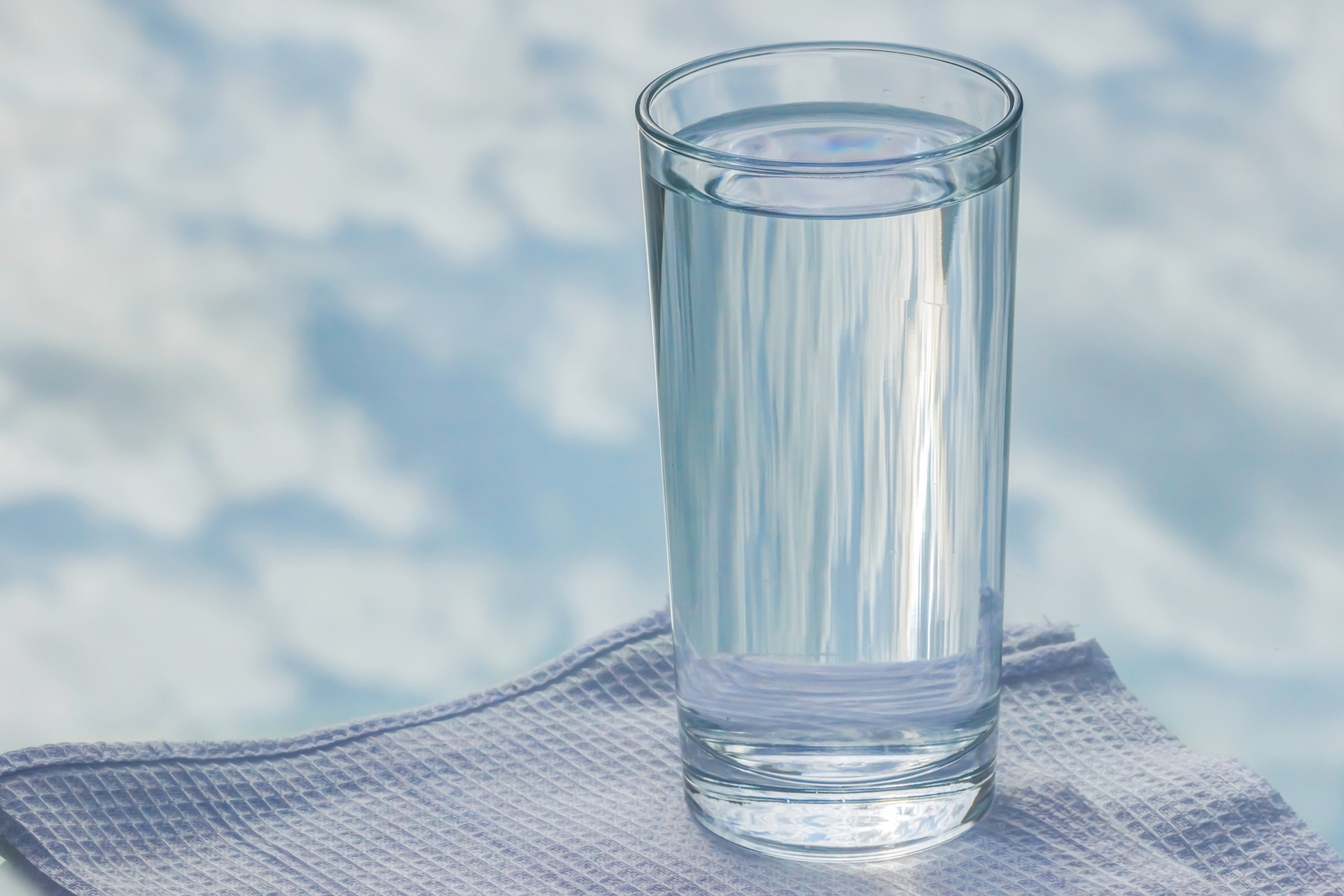 Drink plenty of fluids, especially water, throughout the day.
Drink plenty of fluids, especially water, throughout the day.- Avoid dehydrating fluids such as alcohol and caffeine.
- Avoid smoking.
- Use a humidifier in each room of your house where you spend a significant amount of time, especially the bedroom. Keep air humidity about 50%. Clean and dry out humidifiers daily to prevent mould and fungus.
- Ensure you get plenty of omega-3 fatty acids through your diet. Natural sources such as fish, flaxseed, walnuts and olive oil are best, but supplements could still be beneficial.
- When reading, watching TV, watching a movie, or doing computer work, blink your eyes regularly on purpose to keep them moist. We naturally blink a lot less during these activities.
- Do not rub your eyes.
- Avoid wearing contact lenses unless under direct supervision of an ophthalmologist.
- Keep makeup and lotions away from your eyelids.
- If light bothers your eyes, wear sunglasses or have the lenses in your eyeglasses tinted with FL-41 (a rose-coloured filter).
- If you have sore, irritated eyelids due to blepharitis, try cleaning them daily with baby shampoo. Use warm, moist cloths on the eyes intermittently to keep them comfortable.
- Carry a wet washcloth in a zip-lock bag when you travel to apply to your eyes when needed.
- Clean your eyelids daily with warm water.
–
“Use a heat pad on the eyes twice a day; this helps, along with gently splashing the closed eyes with warm water following application and then washing eyelids and lashes gently with baby shampoo.”
Are there any treatments?
Although it may vary in severity, ‘dry-eye’ is generally a problem that requires long-term treatment with artificial tears (eye-drops). Milder cases are usually effectively managed by a GP although more severe cases may require additional advice from an ophthalmologist (eye specialist).
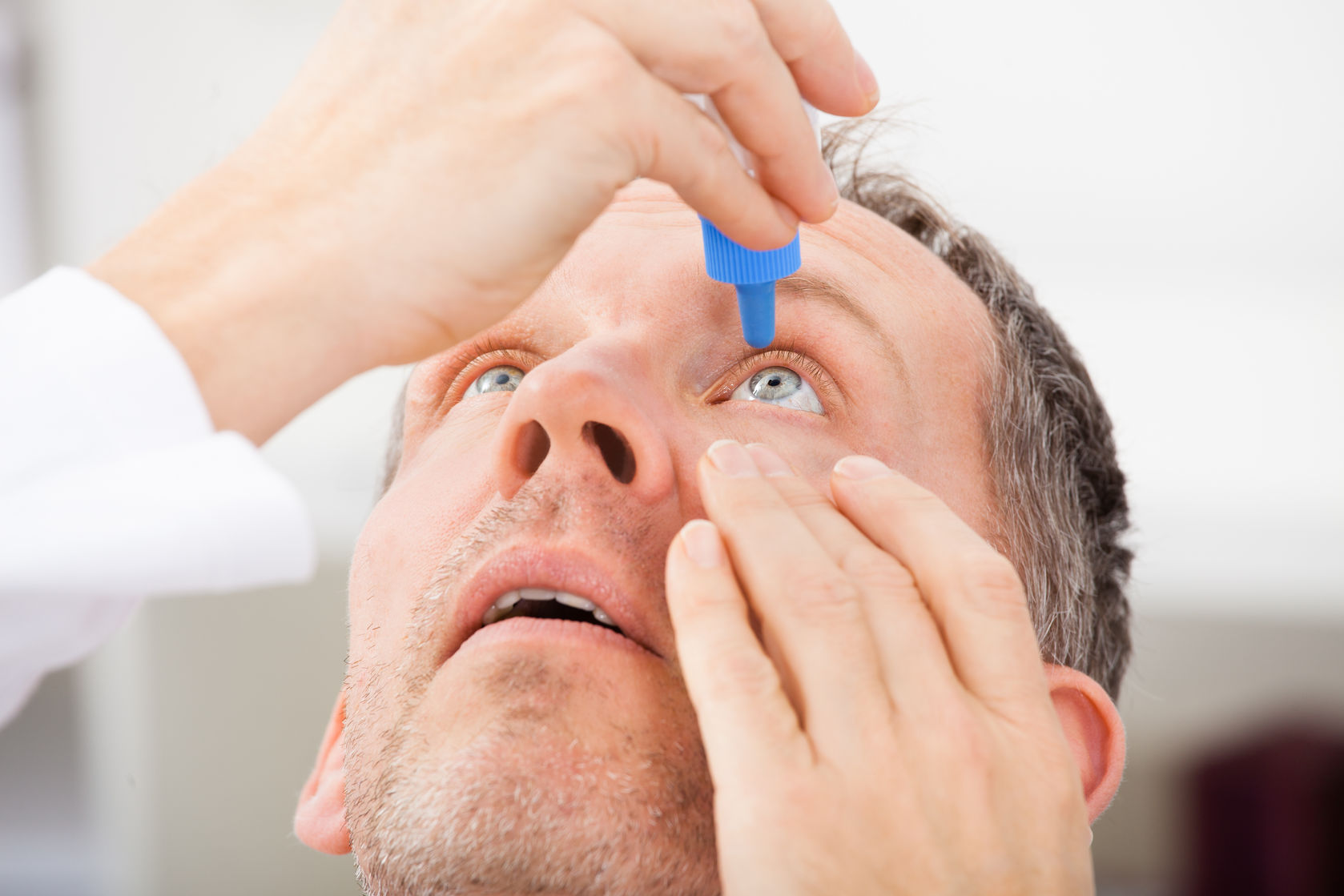 There is a wide range of eye drops available. There are watery drops like hypromellose, which are convenient, but the effects do not last very long. Gels such as Carbomer lie somewhere in-between. Mild dry-eye may only require the use of a watery drop or gel a few times a day, which can be increased as required. Use them regularly; don’t wait for your eyes to dry out. Gels and most watery drops usually contain preservatives, which can cause irritation. If this is a problem then a preservative-free equivalent should be used.
There is a wide range of eye drops available. There are watery drops like hypromellose, which are convenient, but the effects do not last very long. Gels such as Carbomer lie somewhere in-between. Mild dry-eye may only require the use of a watery drop or gel a few times a day, which can be increased as required. Use them regularly; don’t wait for your eyes to dry out. Gels and most watery drops usually contain preservatives, which can cause irritation. If this is a problem then a preservative-free equivalent should be used.
“I used to underestimate how often I needed to use my eye drops and therefore they were even drier. My eye consultant said I must increase their use in the day and always use gel etc. at night.”
“Hylo-care eye drops have made a huge difference for me, as I am allergic to the preservatives in eye drops.”
“I use Thealoz Duo for my eyes. It’s preservative free and when applied before sleep it provides overnight relief for me.”
In some cases thick paraffins may be recommended as they are long lasting but may blur the vision. More severe dry-eye will require frequent use of a combination of drops e.g. frequent gel by day with a paraffin at night. Other drops sometimes used in severe cases are sodium hyaluronate and acetylycysteine.
“For the eyes I use Hylo-Forte drops and Viscotears for night-time.”
If dryness continues to be a problem, doctors can try other measures to help. For example, using prescription cyclosporine eye drops. Cyclosporine is an immunosuppressant medication. One drop is placed in each eye twice a day and it decreases the amount of inflammation of the lacrimal and Meibomian glands, allowing them to produce more tears and meibum so that the eyes and eyelids are better lubricated.
If this does not work, another intervention involves the ophthalmologist inserting tiny plugs into the ducts of the eyes. These plugs make tears drain away from the eyes more slowly, allowing the tear film to increase and the eyes to become moister. They can be extremely effective but may need to be used in conjunction with eye drops.
“I was getting bouts of corneal abrasion because of ingrowing lashes and dryness so was referred to ophthalmology. The procedure was quite straight forward; anaesthetic eye drops then the plugs were inserted by the eye consultant. I didn’t feel a thing. I was disappointed at first as I didn’t feel any immediate improvement but after about two weeks they’d bedded in and I was a new woman!”
“Silicone punctal plugs are good in the respect that they help the eyes to retain drops for longer and thus the eyes are relieved. The plugs are inserted by an ophthalmologist and the procedure takes 5 minutes and is pain free.”
Dry Mouth
What causes it?
When the glands that secrete saliva (the salivary glands) become inflamed and damaged it causes decreased saliva production. Just as with dry eyes, dryness of the mouth can cause many different problems;
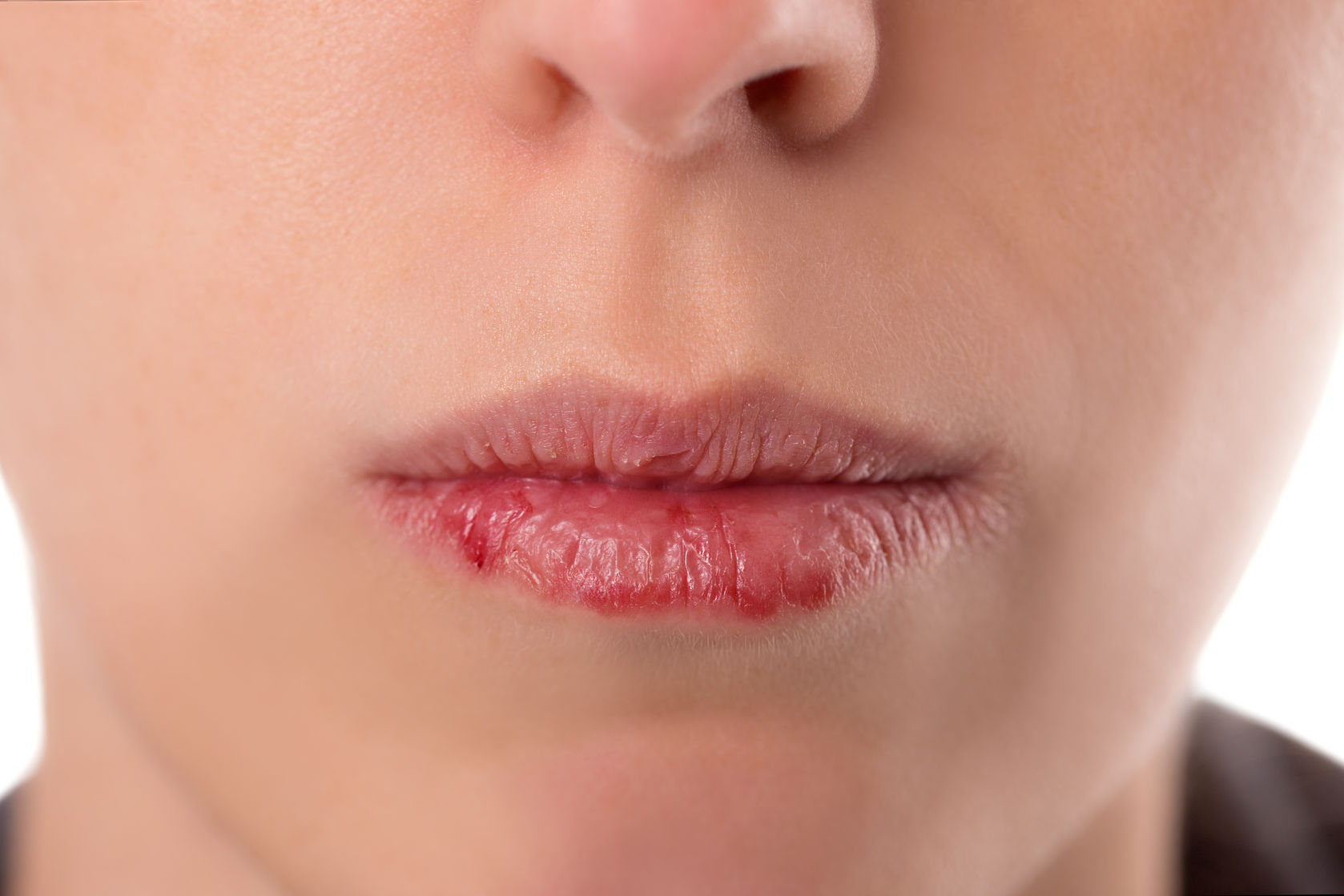 Swelling of the parotid glands on the sides of the jaw, causing a hamster-like appearance and becoming tender and painful.
Swelling of the parotid glands on the sides of the jaw, causing a hamster-like appearance and becoming tender and painful.- Tongue sticking to the roof of the mouth.
- Increased feeling of needing to drink fluids throughout the day.
- Insomnia, waking up with a dry mouth, and having daytime fatigue.
- Difficulty swallowing dry foods without fluid.
- Sore throat.
- Dry, cracked, sore lips.
- Difficulty tasting food.
- Difficulty talking for very long.
- Worsening of heartburn.
- Hoarseness
- Dry cough.
- Oral thrush (white patches in mouth, sore red tongue, or sore corners of lips).
- Increased dental cavities.
- Gingivitis (sore, bleeding gums).
- Loss of teeth.
- Bad breath.
–
“My mouth gets so dry I have to peel my tongue off the roof of my mouth like Velcro. I’ve no idea what to do as nothing really seems to help.”
How is it diagnosed?
If Sjögren’s syndrome is suspected as the cause of your dry mouth your doctor may order a lip biopsy. In people with Sjögren’s clumps of white blood cells, which are produced by the immune system, can form inside the glands where saliva is produced. To check for this, a very small piece of tissue from the inside of your lip may be removed and looked at under a microscope. Local anaesthetic is injected into your lip to numb it for the procedure.
What can I do to help manage dry mouth?
There are many things that can be done to help with dry mouth;
- Drink plenty of fluids, especially water, throughout the day.
- Avoid dehydrating fluids such as alcohol and caffeine.
- Avoid smoking.
- Use a humidifier in each room of your house where you spend a significant amount of time, especially the bedroom. Keep air humidity about 50%. Clean and dry out humidifiers daily to prevent mould and fungus.
- Use gum and mints that contain xylitol throughout the day. Other sugarless gums will not prevent tooth decay.
- Drink water throughout the day; make sure each swallow moves through your teeth. Taking multiple small sips works better than larger drinks of water less often.
- Use lubricating sprays such as Biotene mouth spray or artificial saliva as needed to keep your mouth moist. Using these frequently in the evening can decrease the need for water and having to get up and urinate throughout the night. Keep some on your bedside stand.
- Apply vitamin E oil to sore, dry parts of your mouth.
- East soft, moist food if you have trouble swallowing.
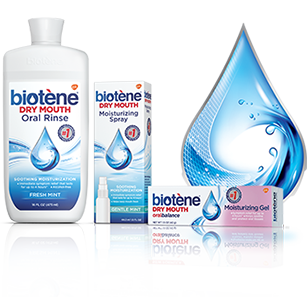 Eat smaller, more frequent meals to stimulate saliva flow more regularly.
Eat smaller, more frequent meals to stimulate saliva flow more regularly.- Avoid salty, spicy, acidic foods (including fruit juices) as well as carbonated beverages (the acid can irritate your dry mouth).
- Use lip balm or petroleum jelly (such as Vaseline) on your lips regularly throughout the day.
- Use moisturising toothpastes and mouthwashes (such as Biotene) two or three times a day. Avoid any mouthwash containing alcohol which dries out the mouth.
- Avoid whitening toothpastes – they may irritate teeth and gums.
- Floss daily (to decrease risk of gum infection).
- Rinse your mouth with water or Biotene mouthwash after eating anything.
- Brush or scrape your tongue at least once a day to remove bad bacteria and fungus (Candida).
- Remove and disinfect dentures, which can harbour bacteria and fungus, daily.
- See your dentist more often than twice a year.
–
“Codeine makes my mouth really dry as do hot drinks (i.e. hot chocolate). Chicken gives me a dry mouth too and pineapple makes my mouth dry and sore. I have stopped eating these things and don’t drink any hot drinks now. I try eating grapes to help keep my mouth from going dry.”
“Things that make it worse; pineapple, tuna, chocolate, hot drinks, spicy food, central heating and breathing during the night.
Things that help it; milk, Biotene toothpaste & mouth gel and Glandosene (although I find this disgusting).”
“100% yellow soft paraffin for my chapped lips. It’s the BEST! When I apply it before going to bed, I wake up with a soft layer that easily comes off if I gently rub it with my finger.”
“The only thing that works for me is Blistex lip cream – it’s like a miracle.”
“I found using fluoride free toothpaste with aloe and tea tree really helped control oral thrush problems”.
“For me it’s the amitriptyline I take at night for pain relief that makes my dry mouth worse. I always have water, sugar free sweets and gum, and Vaseline for my lips.”
“Take sips of water frequently. Drinking vast amounts in one go can actually make our mouths dryer. When using mouthwash, don’t just swill; take time to ensure the mouthwash coats all the surface of our mouth for several minutes.”
“Xylimelts are amazing for a dry mouth especially overnight. They can only be bought online. They are little tablets you stick to your gums and they stimulate saliva production over several hours. Before I found these I woke hourly for water. Now I mostly get a night’s sleep. You can buy them online HERE.”
“I buy Oralieve toothpaste or Kingfisher; neither of which contain SLS which can be problematic with dry mouth.”
Are there any treatments?
There are several different types of saliva substitutes available, including sprays, lozenges (medicated sweets) and gels. You may need to try a few types to find one that works for you. It is important to note that these products don’t help prevent mouth infections in the same way that saliva does, so it’s still important to practise good oral hygiene.
“I was prescribed the BioXtra Mouth Gel by one of my consultants. BioXtra is available as a dry mouth oral gel, gel mouth spray, mouth rinse as well as a mild toothpaste too.”
If all of the above measures are taken and you still have difficulty with dry mouth, especially if it is causing dental problems or infections, then a doctor may prescribe pilocarpine to help the salivary glands to make more saliva. Pilocarpine is taken four times a day and causes the salivary glands to work harder at secreting saliva. It needs to be taken regularly all the time, and it can take up to three months for the treatment to work. It can have a number of potential side effects and interactions with other conditions so may not be suitable for everyone. You can find more information about pilocarpine HERE.
Further Reading
British Sjögren’s Syndrome Association (BSSA)
Their information sheet can be downloaded from their website HERE.
NHS Choices – Sjögren’s syndrome
***Please note that this article is written for informational purposes only and should not be a substitute for professional medical advice or treatment. Do not delay seeking or disregard medical advice based on information here. Always seek the advice of your local family physician or other qualified health professional before starting any new treatment or making any changes to existing treatment. It is also advisable to consult a medical professional before making any changes to diet or starting complementary remedies, which may interact with other medications.***
Thank you so much to everyone who submitted their tips and experiences for this month’s topic. We’re sorry if we weren’t able to use your comment in the article this time.

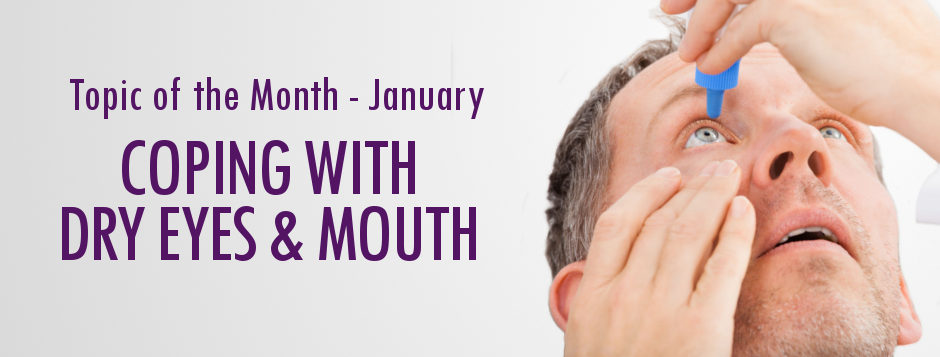

 ©2024 LUPUS UK (Registered charity no. 1200671)
©2024 LUPUS UK (Registered charity no. 1200671)